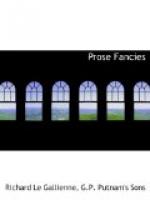Down by the river there is, as yet, little sign of spring. Its bed is all choked with last year’s reeds, trampled about like a manger. Yet its running seems to have caught a happier note, and here and there along its banks flash silvery wands of palm. Right down among the shabby burnt-out underwood moves the sordid figure of a man. He seems the very genius loci. His clothes are torn and soiled, as though he had slept on the ground. The white lining of one arm gleams out like the slashing in a doublet. His hat is battered, and he wears no collar. I don’t like staring at his face, for he has been unfortunate. Yet a glimpse tells me that he is far down the hill of life, old and drink-corroded at fifty. He is miserably gathering sticks—perhaps a little job for the farm close by. He probably slept in the barn there last night, turned out drunk from the public-house. He will probably do and be done by likewise to-night. How many faggots to the dram? one wonders. What is he thinking as he rustles about disconsolately among the bushes? Of what is he dreaming? What does he make of the lark up there? But I notice he never looks at it. Perhaps he cannot bear to. For who knows what is in the heart beneath that poor soiled coat? If you have hopes, he may have memories. Some day your hopes will be memories too—birds that have flown away, flowers long since withered.
III
A short way further along I come across a boy gathering palm. He is a town boy, and has come all the way from Whitechapel thus early. He has already gathered a great bundle—worth five shillings to him, he says. This same palm will to-morrow be distributed over London, and those who buy sprigs of it by the Bank will know nothing of the blue-eyed boy who gathered it, and the murmuring river by which it grew. And the lad, once more lost in some squalid court, will be a sort of Sir John Mandeville to his companions—a Sir John Mandeville of the fields, with their water-rats, their birds’ eggs, and many other wonders. And one can imagine him saying, ‘And the sparrows there fly right up into the sun, and sing like angels!’ But he won’t get his comrades to believe that.
IV
Spring has a wonderful way of bringing out hidden traits of character. Through my window I look out upon a tiny farm. It is kept by a tall, hard-looking, rough-bearded fellow, whom I have watched striding about his fields all winter, with but little sympathy. Yet it would seem I have been doing him wrong. For this morning, as he passed along the outside of the railing wherein his two sheep were grazing, suddenly they came bounding towards him with every manifestation of delight, literally recalling the lambkins which Wordsworth saw bound ‘as to the tabor’s sound.’ They followed as far as the railing permitted, pushing their noses through at him; nay, when at last he moved out of reach, they were evidently so much in love that they leaped the fence and made after him. And he, instead of turning brutally on them, as I had expected, smiled and played with them awhile. Indeed, he had some difficulty in disengaging himself from their persistent affection. So, evidently, they knew him better than I.




